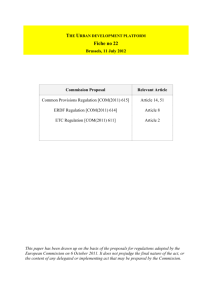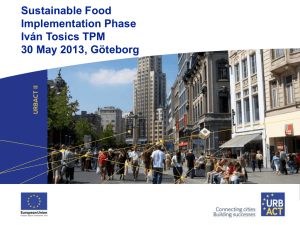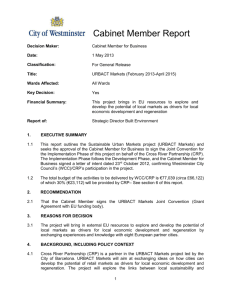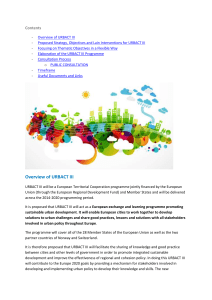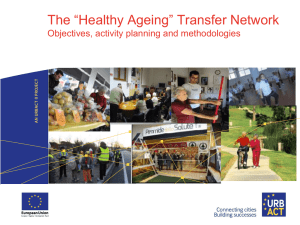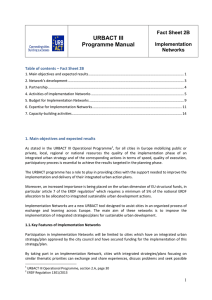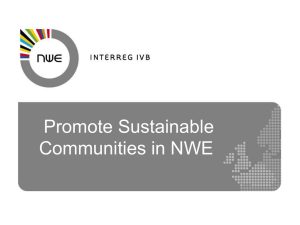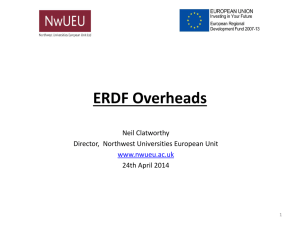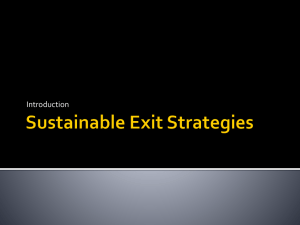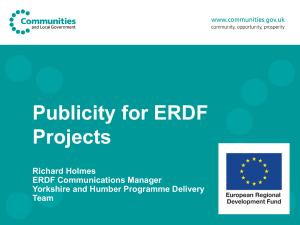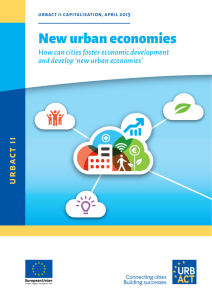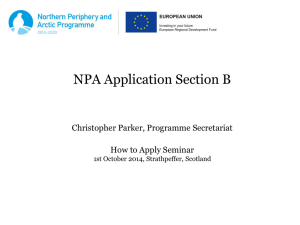URBACT - Platform31
advertisement
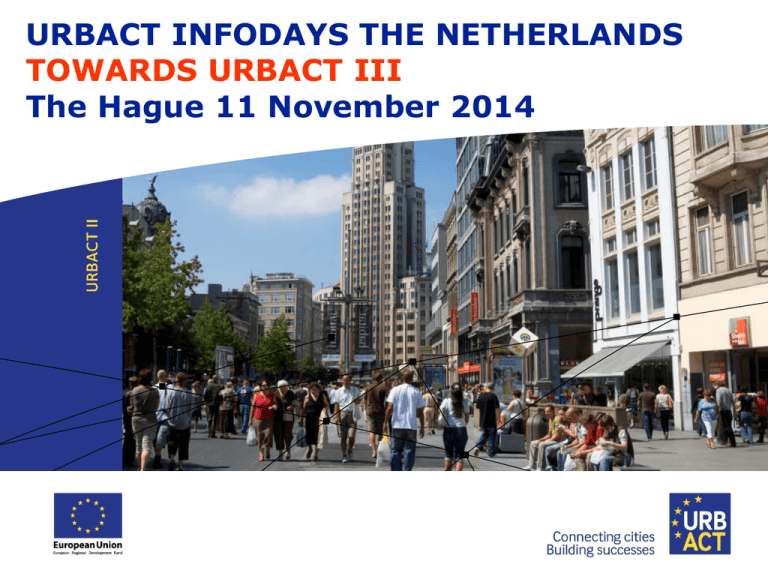
URBACT INFODAYS THE NETHERLANDS TOWARDS URBACT III The Hague 11 November 2014 URBACT IN A NUTSHELL Objectives Activities URBACT II so far URBACT IN A NUTSHELL European Territorial Cooperation programme (ETC), financed by ERDF and Member States/ Partner States (Switzerland and Norway) Main objective To promote integrated and sustainable urban development in EU cities by facilitating the exchange of experience and learning among cities drawing lessons, identifying and disseminating good practices supporting urban practitioners in developing integrated action plans MAIN ACTIVITIES TRANSNATIONAL NETWORKS Allowing cities to share experiences/ problems/ solutions, to learn from one another, identify good practices to design integrated urban policies CAPACITYBUILDING Enhancing the capacities of urban practitioners and policy-makers to develop integrated and participatory approaches to urban development CAPITALISATION DISSEMINATION Capitalizing and disseminating urban knowledge, practices, policy recommendations to a wider audience of policy-makers and practitioners NETWORKING in URBACT Transnational Network URBACT Cities with common problems coming together to learn from one another and work together on integrated solutions Knowledge Good practices, policy recommendations, etc. • Funding • Methods Policy • Expertise • Capacitybuilding City level Local Stakeholders working in partnership to co-produce Integrated Action Plans Integrated action plans URBACT II SO FAR... 52 networks (3 Calls) 500 partners from 26 MS & Switz. & Norway 5000 local stakeholders involved in local partnerships for the coproduction of Local Action Plans 350 Local Action Plans produced (call 1 & 2) URBACT II SO FAR... Capacity building activities o 2 Summer Universities o National Training seminars o Pilot Training for Elected officials Capitalisation to share knowledge and good practices about how cities are actually addressing urban challenges The Netherlands and URBACT II The URBACT III programme Objectives & Activities 3 Types of network Beneficiaries How to join Provisional calendar URBACT III – 4 main objectives To improve the capacity of cities to manage sustainable urban policies and practices in an integrated and participative way To improve the design and implementation of integrated urban sust strategies/ action plans in cities To ensure that practitioners and decision makers at all levels have access to knowledge and share knowhow on all aspects of sustainable urban development 3 MAIN STRANDS OF ACTIVITIES TRANSNATIONAL NETWORKS Allowing cities to share experiences/ problems/ solutions, to learn from one another, identify good practices to design & implement integrated urban policies CAPACITYBUILDING Enhancing the capacities of urban practitioners and policy-makers to develop integrated and participatory approaches to urban development CAPITALISATION DISSEMINATION Capitalizing and disseminating urban knowledge, practices, policy recommendations to a wider audience of policy-makers and practitioners URBACT III Networks – a diversified offer 3 types of networks proposed Action Planning Networks Implementation Networks Transfer Networks Action-planning networks Main purpose To support cities with the design of integrated sustainable urban strategies/ action plans Who? Cities sharing common urban challenges and willing to address them by developing integrated solutions Expected outcomes • Integrated strategies for sustainable urban development • Integrated action plans on one or several policy areas (to operationalise an existing strategy) • Learning and recommendations for EU cities Implementation networks Main purpose To support cities with the implementation of integrated sustainable urban strategies/ action plan Who? Cities implementing integrated strategies and action plans having secured different types of funding, including cities implementing integrated urban strategies and actions under article 7 (eg ITI, CLLD) Expected outcomes • Enhanced implementation of integrated strategies/ action plans for sustainable urban development (monitoring, timely delivery of actions, etc.) • Learning and recommendations for EU cities Transfer networks Main purpose To support cities with the transfer of good practice so as to improve the implementation of integrated sustainable urban strategies/ action plans Who? Cities willing to transfer locally practices of integrated urban development identified in other EU cities Expected outcomes • Transferred good practice in receiving cities • Enhanced good practice • Learning and recommendations for EU cities Common features of URBACT networks Beneficiaries Partnerships Funding MAIN BENEFICIARIES Main beneficiaries Cities from EU 28 Member States, Norway & Switzerland including: Cities, municipalities, towns without limit of size Infra-municipal tiers of government Metropolitan authorities & organized agglomerations Other beneficiaries Local agencies Provincial, regional and national authorities Universities and research centers All beneficiaries shall be public or public equivalent bodies PARTNERSHIPS A lead partner city A limited number of partners 8-12 partners in Action-planning & Implement° networks 6-8 partners in Transfer networks A majority of cities – 3 non-city partners max Balance between partners from less developed regions and partners from more developed/ transition regions FUNDING Network budget: 600.000 – 750.000 euros ERDF + local contributions from cities - Less developed & Transition: 85% ERDF More developed: 70% ERDF Local contribut° ERDF Additional envelope for expert support up to 127.000 euros/ network Ongoing support by the URBACT Secretariat (tools, methods, training, etc.) Transnational Exchange ERDF co-financing Co-financing from ERDF of beneficiary cities and other eligible beneficiaries for the actions implemented Less developed and transition regions shall receive 85% ERDF contribution More developed shall receive 70% ERDF contribution Willing to join ? URBACT launches calls for proposals 2 main stages – 2 opportunities for you to join Declaration of interest - initial partnership (average 5 cities) - identified urban challenge to be addressed Final proposal - complete partnership (average 10 cities) - refined thematic focus and policy issues to be addressed - baseline study/ state of play in all partner cities - work plan and list of deliverables Call for Proposals Submission Declaration of Interest !!! Initial partnership with identified common urban challenge Eligibility check & Assessment Approval & funding 6-month to develop final proposal Submission of Final proposal !!! Eligibility check & Assessment Approval & funding 24 month to implement network activities and deliver Extended partnership with complete network proposal PROVISIONAL CALENDAR 2015 Beginning 2015 1° call for Action-planning networks End 2015 1° calls for Transfer networks 1° call for Implementation networks PROVISIONAL CALENDAR 1st CALL FOR ACTION-PLANNING NETWORKS March 2015: 1st call Action-planning March-June 2015: applicants preparing bids URBACT FEST June 2015: submission of proposals Riga, 6-8 May 2015 July-Aug 2015: eligibility check & assessment Sept 2015: MC approval funding 6-month preparatory phase Mid Sept 2015- Mid March 2016: 6-month Prep Phase Mid March 2016: submission Final Proposals March-April 2016: eligibility check & assessment April 2016: MC final approval funding for network April 2016-April 2018: 24-month for network activities Partner search facility on URBACT website Action Planning Implementation Transfer Phasing and Duration Phase 1: 6 months Phase 2: 24 months Phase 1: 6 months Phase 2: 24 months Phase 1: 6 months Phase 2: 24 months Lead Partner City City City N° PP Phase 1 4/6 (only cities) – from minimum 3 MS/PS 4/6 (only cities) - from minimum 3 MS/PS 4/6 (only cities) - from minimum 3 MS/PS Geographical Balance Phase 1 Minimum 2 Less Developed Minimum 2 Less Developed Minimum 2 Less Developed ** N° PP Phase 2 8/12 (max 3 non-city) 8/12 (max 3 non-city) 6/8 (max 3 non-city) Geographical Balance Phase 2 Minimum 4 Less Developed Minimum 4 Less Developed • Minimum 2 Less Developed if 6 PP • Minimum of 3 if 7 or 8 PP ** Co-financing rates • 70% More Developed • 85% Less Developed and Transition • 70% More Developed • 85% Less Developed and Transition • 70% More Developed • 85% Less Developed and Transition Budget Between 600k and 750k € Between 600k and 750k € Between 600k and 750k € Expertise 127.500€ 127.500€ 127.500€ Capacity Building yes yes yes How to apply and join ? A staged process with 7 main steps 1. Open call for proposals 2. Submission of Declaration of interest 3. Assessment & selection of projects to be supported for development 4. 6-month phase to develop network proposal 5. Submission of Application 6. Assessment & selection of projects to be funded 7. 24-month phase to implement network activities and deliver expected outputs 2 moments to join a network Step 2 – Declaration of interest – in the initial partnership Step 4 – During 6-month dvpt phase – in the extended partnership Thematic Concentration Thematic concentration with a flexible approach to find answers to the various needs of cities To help achieve the EU2020 goals, concentration of 70% of transnational exchange budget to 5 Thematic Objectives: strengthening research, technological development and innovation supporting the shift towards a low-carbon economy in all sectors protecting the environment and promoting resource efficiency promoting social inclusion and combating poverty promoting employment and supporting labour mobility The remaining 30% will be available for all other themes based on a bottom up approach contact@urbact.eu www.urbact.eu
